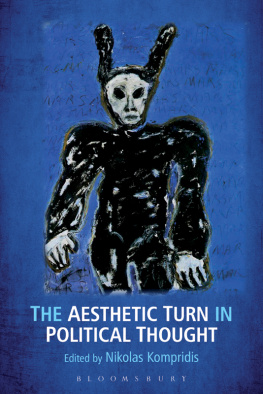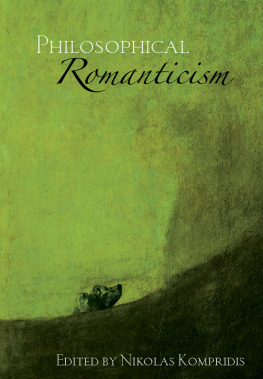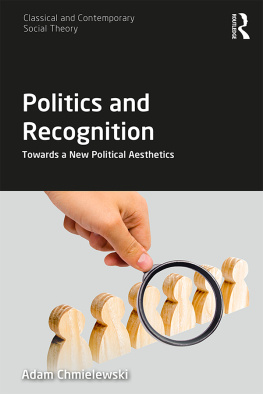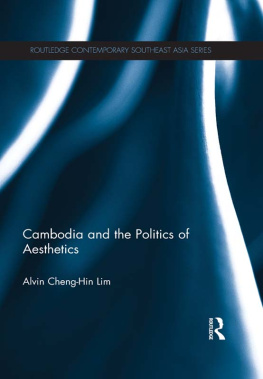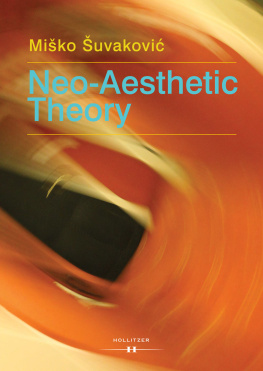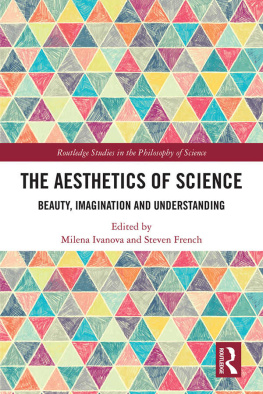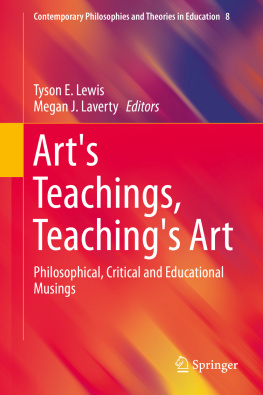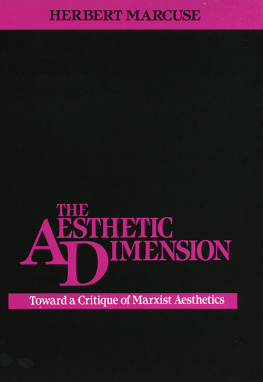The Aesthetic Turn in Political Thought
The Aesthetic Turn in Political Thought
EDITED BY
NIKOLAS KOMPRIDIS

For Stanley Cavell
I would like to thank all the contributors for their terrific contributions to this volume, and for their forbearance and patience through its many twists and turns (pardon the pun), including the many interruptions that delayed its publication. I want also to thank all the people at Bloomsbury who helped along the way, and for their patience, too, not least, Matthew Kopel, Kaitlin Fontana, Dominic West, and James Tupper.
Finally, I want especially to thank Morton Schoolman for conceiving the APSA and WPSA panels on the aesthetic turn, for drawing attention to it in the first place, and for various forms of intellectual support over the years.
The volume is dedicated to Stanley Cavell in recognition of all that I have learned from him about the aesthetic problems of philosophy, ethical and political, and in gratitude for the many paths he has opened to the still untapped and still unacknowledged resources of American and European romanticism.
***
Bloomsbury would like to thank the publishers of select works in this volume for granting permission to reproduce. Rights questions about these works should be directed to the original publishers.
The aesthetic dimension: Aesthetics, politics, knowledge by Jacques Rancire is reproduced by permission from Critical Inquiry 36, Autumn 2009 (Chicago: The University of Chicago Press, 2009). 0093-1896/09/3601-0006 2009 by the University of Chicago.
Recognition and receptivity: Forms of normative response in the lives of the animals we are by Nikolas Kompridis is reproduced by permission from New Literary History, (Baltimore: Johns Hopkins, 2013), 44: 124.
We feel our freedom: Imagination and judgment in the thought of Hannah Arendt by Linda M. G. Zerilli is reproduced by permission from Linda M. G. Zerilli, We Feel Our Freedom: Imagination and Judgment in the Thought of Hannah Arendt (Thousand Oaks, CA: Political Theory, SAGE) 10.1177/0090591704272958.
Writing a name in the sky: Rancire, Cavell, and the possibility of egalitarian inscription by Aletta J. Norval is reproduced by permission from Aletta J. Norval, Writing a Name in the Sky: Rancire, Cavell, and the Possibility of Egalitarian Inscription (American Political Science Review, 2012), 106 (4): 81026.
Romand Coles
Northern Arizona University, USA
Romand Coles is the Frances B. McAllister Chair and Director of the Program for Community, Culture and Environment at Northern Arizona University where he is a leader in a movement for engaged democratic pedagogy. His books include Beyond Gated Politics: Reflections for the Future of Democracy (Minnesota, 2005), Rethinking Generosity: Critical Theory and the Politics of Caritas (Cornell, 1997), Christianity, Democracy, and the Radical Ordinary: Conversations between a Christian and a Radical Democrat (with Stanley Hauerwas) (Wipf and Stock, 2008), and Self/Power/Other: Political Theory and Dialogical Ethics (Cornell, 1992). He has recently completed a book tentatively titled Radical Ecological Democracy: Receptive Resonance, Circulation, and the Dynamics of Transformation, and is working on a co-authored book on the aesthetic dimension of politics with Lia Haro.
Jason Frank
Cornell University, USA
Jason Frank is Associate Professor of Government at Cornell University. He is the author of Constituent Moments: Enacting the People in Postrevolutionary America (Duke University Press, 2010), Publius and Political Imagination (Rowman & Littlefield, 2013), and editor of A Political Companion to Herman Melville (University Press of Kentucky, 2013). He has published widely in democratic theory and American political thought and is currently working on a project titled The Democratic Sublime: Political Theory and Aesthetics in the Age of Democratic Revolution.
Lewis R. Gordon
University of Connecticut, USA
Lewis R. Gordon is Professor of Philosophy and Africana Studies at the University of Connecticut; Europhilosophy Visiting Chair at Toulouse University, France; and Nelson Mandela Visiting Professor at Rhodes University, South Africa. His books include Fanon and the Crisis of European Man: An Essay on Philosophy and the Human Sciences (Routledge) and An Introduction to Africana Philosophy (Cambridge). His website is: http://lewisrgordon.com
Lia Haro
Duke University, USA
Lia Haro is an anthropologist and literary theorist from Duke University. She is completing a manuscript on contemporary global development, poverty and utopianism entitled The End(s) of the End of Poverty. She has done extensive direct action fieldwork in Africa and Latin America. She is also working on a co-authored book on the aesthetic dimension of politics with Romand Coles.
Nikolas Kompridis
Australian Catholic University
Nikolas Kompridis is Research Professor of Philosophy and Political Thought and Foundation Director of the Institute for Social Justice at the Australian Catholic University. He has published widely on a broad spectrum of topics in philosophy and political theory, and is the author of Critique and Disclosure: Critical Theory between Past and Future (MIT, 2006) and Philosophical Romanticism (Routledge, 2006). He is currently completing two new books, one on a normative theory of receptivity, and the other on the renewal of philosophical and political romanticism.
Patchen Markell
University of Chicago
Patchen Markell is Associate Professor of Political Science at the University of Chicago and the author of Bound by Recognition (Princeton University Press, 2003). He is currently completing a book on Hannah Arendts The Human Condition, elements of whose argument also appear in articles and chapters in The American Political Science Review (2006), College Literature (2011), and Radical Future Pasts: Untimely Political Theory, ed. Mark Reinhardt, Rom Coles, and George Shulman (Kentucky, 2014).
Aletta J. Norval
University of Essex, United Kingdom
Aletta Norval is Professor in Political Theory in the Department of Government, University of Essex. Her monographs include Aversive Democracy (2007). Inheritance and Originality in the Democratic Tradition (Cambridge University Press), and Deconstructing Apartheid Discourse (Verso, 1996). She is co-editor of Practices of Freedom: Decentred Governance, Conflict and Democratic Participation (Cambridge, 2014), South Africa in Transition (Macmillan, 1998) and Discourse Theory and Political Analysis (Manchester University Press, 2000). She is currently working on a book on Wittgenstein and Cavell. She is Consulting Editor of Political Theory and serves on the editorial boards of Theory & Event, Acta Philosophica and Politikon.
Melissa A. Orlie
University of Illinois, USA
Melissa Orlie teaches political theory at the University of Illinois, Urbana-Champaign (http://www.pol.illinois.edu/people/orlie). Her writing engages tensions and convergences among political, ecological, psychoanalytic and ethical concerns. She is currently finishing a long-term book project entitled The Nietzsche we need now, from which the essay for this volume was drawn.

